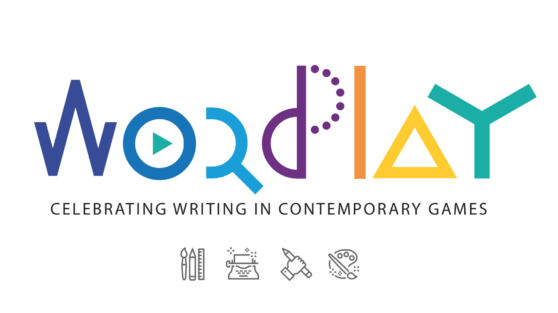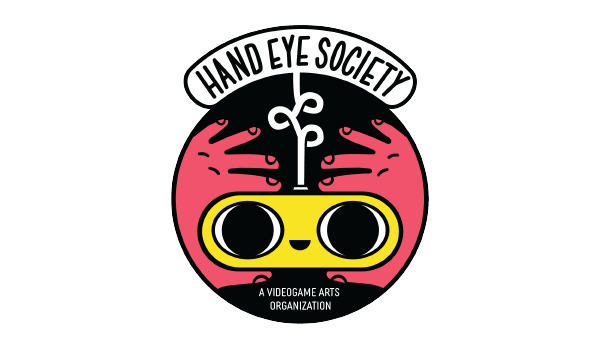
Meet the Guest Stars of WordPlay 2019
 Event Details
Event Details
Sat. November 9th, 11 am – 4:30 pm
Sun. November 10th, 1:30 pm – 4:30 pm
Toronto Reference Library
789 Yonge St. (Bloor-Yonge subway)
FREE!
Hey everyone! This month, everything’s coming up WordPlay! You’ve known it in the past as is our free one-day festival celebrating the most interesting uses of writing and words in contemporary games. But this year we’re blowing it up into two days of wordtasticness. And to do that, we’ve enlisted the help of a stunning array of guest stars who will be presenting a series of fascinating talks, informative workshops, and inspiring performances.
[button size=’large’ style=” text=’See the games of WordPlay 2019!’ icon=” icon_color=” link=’https://www.handeyesociety.com/event/wordplay-games-2019/’ target=’_self’ color=” hover_color=” border_color=” hover_border_color=” background_color=” hover_background_color=” font_style=” font_weight=” text_align=” margin=”]
It’s my distinct pleasure to present to you our official schedule for WordPlay 2019!
Schedules
Saturday
| Main Stage (Atrium) | Learning Centre 1 (Showcase Space) | ||
|---|---|---|---|
| Time | Speakers | Event | Event |
| 11:00 AM | Festival Begins – Welcome and Opening Remarks | Arcade Showcase | |
| 11:30 AM | Kate Gray | How Romance In Games Can Change The World | |
| 12:00 PM | Alexander King | Artisanal Procedurality: Designing Procedural Word Puzzles using Classic Literature | |
| 12:30 PM | ~Break~ | ||
| 1:00 PM | Jordan Jones-Brewster & Carol Mertz | The Design of ‘We Should Talk’: Putting a New Spin On Narrative Choice | |
| 1:30 PM | Robert Kori Golding | Pushing Storytelling in Location-Based Games | |
| 2:00 PM | ~Break~ | ||
| 2:30 PM | Betty Robertson / Evangelia Fahantidou | Mission Design & Game Writing: A Marriage | |
| 3:00 PM | David Evans | A Soundscape is Worth a Thousand Words. | |
| 3:30 PM | ~Break~ | ||
| 4:00 PM | Micro-Talks | See Below | |
| 4:30 PM | End of Saturday Talks | ||
Micro-Talks
| Main Stage (Atrium) | |
|---|---|
| Speakers | Event |
| Alfe Clemencio | Making Choices Matter and More! (explained in under 6 mins) |
| Benoit Esmein | The importance of showers in Indie Game Localization |
| Xalavier Nelson Jr. | We Don’t Talk About The Toilets: Worldbuilding with Purpose |
Sunday
| Learning Centre 2 (Workshop Space) | Hinton Theatre (Performance Space) | Learning Centre 1 (Showcase Space) | |||
|---|---|---|---|---|---|
| Time | Speakers | Event | Speakers | Event | Event |
| 1:45 PM | Jim Munroe | Creating Interactive Fiction With Texture Writer | Xalavier Nelson Jr. | Disco Never Died (But It Is Trying To Kill You): A #DISCOGAME | Arcade Showcase |
| 2:00 PM | |||||
| 2:30 PM | |||||
| 3:00 PM | |||||
| 3:30 PM | Em Lazer-Walker | Chill with Em! (Details TBD) | Squinky | How Making Videogames Turned Me Into a Depressed Gay Communist | |
| 4:00 PM | |||||
| 4:30 PM | ~End~ | ~End~ | |||
Now that you’ve seen our schedule come meet the people who are making it all happen – allow me to introduce our WordPlay 2019 speakers!
Alexander King
Alexander King is a game designer and professor based in Brooklyn, New York. His work centers on data-driven design and simulation, and he was the systems and economy designer on the recently released Apple Arcade launch title Dear Reader. Alexander is also an adjunct professor at the NYU Game Center and Parsons School of Design, where he has taught classes on game design, and math and economics for games. Before working in games, Alexander was an analytics consultant working in finance and eCommerce, but now the economies he models are largely fictional ones.
Talk: Artisanal Procedurality: Designing Procedural Word Puzzles using Classic Literature
Join us for a close-up view of the systems behind Dear Reader, a mobile game that uses the text of public domain literature as the raw material for procedural wordplay. The design of Dear Reader balances algorithmic elements and manually-defined components. Designer Alexander King will walk through the game’s development in finding this balance, and share some best practices and lessons learned from turning classic books into procedural puzzles.
Alfe Clemencio
Alfe Clemencio is an indie game developer behind the company Sakura River Interactive. He gave a talk at University of Waterloo, was a guest at Fan Expo, and exhibited at Tokyo Game Show. His passion for gameplay-impactful story choices in games has led him to study various techniques in games new and old. As old as DOS at least.
Micro-talk: Making Choices Matter and More! (explained in under 6 mins)
If you ever scratched your head about how to make choices matter this talk is for you. Learn about “meta” characters, foreshadowing for “fairness”, compound choices and more!
Benoit Esmein
Benoit: I fell into game localization at a very early age. When I was around 7, my dad started localizing games aimed at children, such as Putt-Putt, Pyjama Sam, Spy Fox, Marine Malice, and my sister, my brother and myself became early localization testers, and contributors. I have always been interested in languages, studying Russian as a first foreign language in school, and became completely fluent in English by spending summers in the US, staying with host families. Taking advantage of my Law background and of my fluency in English, I started translating professionally in 2015, in order to finance a double Bachelors in Scandinavian Languages and Russian, and to support myself while moving and trying to settle in Sweden. Life happened and led me to move to Canada to be closer to my partner. I have so far worked on 16 games and game-related projects, ranging from Indie (Russian Subway Dogs, Quench) to AAA (Battlefield 1, For Honor, CoD Black Ops 4).
Micro-talk: The importance of showers in Indie Game Localization
In a world that is increasingly rushed, and where localization can often be an afterthought for developers, leading to compressed deadlines, I make the case for leaving ample time for translators to do multiple passes on their work. I will go over the necessity, especially for Indie developers, to take into account the effects that a bad localization can have on the success of their game abroad, whether it breaks immersion or simply isn’t funny. I will touch on Deep Work (concept popularized by Cal Newport), background brain processing and what the French call “esprit d’escalier”, and the importance of taking breaks to produce work that one can be proud of.
Betty Robertson & Evangelia Fahantidou
Betty Robertson is a Narrative Designer and Writer at Ubisoft Montreal. She’s worked on Assassin’s Creed Odyssey, and on the Odyssey Story Packs. She was one half of the coordinators for the Pixelles Game Writing Incubator from 2018-2019. A graduate of Camosun College, and BCIT, Betty is well versed in Creative Writing, Game Design, and Education. She considers herself a snappy dresser, and funnier than she actually is.
Evangelia Fahantidou is a Level Designer at Ubisoft Montreal. She was a Quest Designer for Assassin’s Creed Odyssey, and the Odyssey Story Packs. She has previously been a Computer Science lab assistant for the Johns Hopkins Center for Talented Youth in Greece and a Game Design Intern for Minority Media. She graduated from Champlain College of Vermont in 2017 with a Bachelor’s degree in Game Design. She denies that she has a coffee addiction and that she understands French.
[vc_row][vc_column width=’1/2′] [/vc_column][vc_column width=’1/2′]
[/vc_column][vc_column width=’1/2′] [/vc_column][/vc_row]
[/vc_column][/vc_row]
Talk: Mission Design & Game Writing: A Marriage
Game Writer Betty Robertson and Mission Designer Evangelia Fahantidou break down the symbiosis of Writing and Mission Design. Common practices, misconceptions about roles, and the best way to compromise.
Dave Evans
Dave Evans is the owner and studio director of Falling Squirrel, a Niagara based indie game dev specializing in the advancement of narrative design and audio game mechanics for visually impared accessibility.
Dave began his career in film and TV as a writer/director before transitioning into AAA games as a Cinema Director (Too Human and X-men Destiny). Indie games eventually provided Dave the opportunity to write, design and direct projects (Phantom Compass’s Pinball/RPG mashup Rollers of the Realm) as well as pursue his own narrative driven projects through his company Falling Squirrel.
The studio’s current project, The Vale, is an audio based action/adventure title slated for launch on PC early next year.
Talk: A Soundscape is Worth a Thousand Words.
Creative Director, Dave Evans walks us through the The Vale; a narrative driven action adventure game that has no visual gameplay. This talk tracks the game’s development from cost-effective narrative experiment, to robust blind accessible game. Dave reflects on the unique freedoms that come with writing for an audio based game, the intimate experiences that 3D soundscapes can create, and how the development of The Vale was an education in how to make mainstream games more accessible.
Em Lazer-Walker
Em (she/they) is a Toronto-based an artist/engineer who makes interactive art, experimental games, and open-source software tools to empower creativity. Most of her work focuses on using nontraditional interfaces to reframe everyday objects and spaces as playful experiences and to inspire people to become self-motivated learners. She currently works as a cloud advocate at Microsoft.
Workshop: Analytics? In MY interactive fiction?!
Capturing analytics data about how players experience your game often feels a bit gross, or like something you’d only want to do if you’re making a AAA or free-to-play game. But it can be a valuable form of getting player feedback, even if you’re making personal and noncommercial narrative games. This workshop will discuss how analytics can be useful as a design tool, but also when getting too caught up in numbers can be a bad thing. We’ll also get hands-on with tools to integrate free analytics into your Twine game, without any coding required — bring your laptops and an existing Twine project if you’d like!
Jim Munroe
Jim Munroe is a “pop culture provocateur” according to the Austin Chronicle. His graphic novels and prose novels have been praised by Pulitzer-winner Junot Diaz and comics legend Neil Gaiman, and his lo-fi sci-fi feature films by Wired and the Guardian. His political videogames have appeared at Sundance and Cannes, and he co-founded the world’s first videogame arts organization. He was an Art Gallery of Ontario Artist-in-Residence in 2014 and he lives in the Junction neighbourhood in Toronto.
Workshop: Creating Interactive Fiction With Texture Writer
Narrative designer and indie game maker Jim Munroe will be running a workshop using a tool he created with Juhana Leinonen, Texture Writer. The session will begin by showcasing standard patterns in choice based fiction, go into paper prototyping, and then the participants will learn to implement their small games.
Jordan Jones-Brewster & Carol Mertz
Jordan Jones-Brewster: Jordan Jones-Brewster is a Brooklyn-based narrative designer, game designer, and writer who’s work focuses on dissecting interpersonal relationships. He has an MFA in Game Design from New York University. You can find them on Twitter @Versiphied.
Carol Mertz: Carol Mertz is an independent game designer, Executive Director of indie game conference PixelPop Festival, and MFA graduate of the NYU Game Center. Having worked for over a decade in interactive arts and media, her portfolio of work centers around creating and supporting multidisciplinary projects that expand our perspective, help us learn about ourselves and each other, and challenge the typical boundaries of play.
[vc_row][vc_column width=’1/2′] [/vc_column][vc_column width=’1/2′]
[/vc_column][vc_column width=’1/2′] [/vc_column][/vc_row]
[/vc_column][/vc_row]
Talk: The Design of ‘We Should Talk’: Putting a New Spin On Narrative Choice
How does it feel to explore a relationship playground? In We Should Talk, players are encouraged to think carefully about the words they choose as they interact with various people in a bar, while also texting their partner at home. Using the sentence spinner mechanic developed for this game, players craft sentences in response to the in-game characters, allowing them to explore the nuances of conversation with interactions of various intimacy levels.
Developers Jordan Jones-Brewster and Carol Mertz describe the development process of that mechanic, and how it allows for a different way to engage with meaningful choices.
Kate Gray
Kate Gray is a British writer living in Canada. She is the Narrative Director at KO_OP, an indie studio in Montreal, and writes about sex and relationships on a regular basis, most notably for Kotaku. She was a full-time journalist before moving to Canada, working for Official Nintendo Magazine, Xbox UK, and GameSpot, among many other sites and publications. She can’t tell you about the project she’s working on right now but she’s pretty sure you’d love it.
Talk: How Romance In Games Can Change The World
Romance, relationships, and sex in games are no longer just sidequests and minigames — they’re ways that developers, artists and storytellers can express themselves and their world within a game. We won’t solve world hunger by playing Dream Daddy, but we can all learn to be kinder, more empathetic beings through romance in games.
Robert Kori Golding
Robert Kori Golding is the co-founder and lead game designer at Albedo Informatics, a Toronto-based development studio with a focus on location-based Augmented Reality (AR) experiences. Albedo is currently developing SIGIL, a location-based AR game that brings myths, folklore and local legends to life. Kori has been crafting geo-locative narrative experiences for the past 14 years.
Talk: Pushing Storytelling in Location-Based Games
With the arrival and widespread success of geo-locative augmented reality (AR) games such as Pokemon Go!, Jurassic World Alive and Harry Potter Wizards Unite, a new medium for storytelling is emerging. With these new types of games, the world itself becomes a giant sandbox for players to explore. As game designers, how can we embrace the unique opportunities presented by this medium to tell stories that truly embrace and integrate the world around the player? In this talk, we will provide an overview of the history of location-based games and narratives. We will also discuss how game designers can meaningfully incorporate local landmarks, terrain types, weather, time of day, local lore, and the experiences of the players themselves in order to forge powerful experiences that capitalize on this nascent medium. We will also provide a brief overview of the current tools available for potential creators.
Squinky
Mx. Dietrich “Squinky” Squinkifer (they/them pronouns) is a new media artist living in Tiohtiá:ke (Montréal). They create playable experiences in the form of videogames, interactive installations, and performances, touching on subjects of gender identity, social awkwardness, and miscellaneous silliness. Recently, Squinky’s work has been shown at the Ars Electronica festival in Linz, Austria, as well as in the Rainbow Arcade exhibition on queer videogames at the Schwules Museum in Berlin. Squinky has also been known to show up to various events making noise with some kind of large brass instrument.
Performance: How Making Videogames Turned Me Into a Depressed Gay Communist
“How Making Videogames Turned Me Into a Depressed Gay Communist” is a solo performance about my experience growing up as an undiagnosed autistic, proto-transgender nerd with immigrant parents, with all the loneliness such an experience entails, and my long time love-hate obsession with videogames that led me to a rocky career making them for money, burning out spectacularly in the process. This performance is illustrated in the self-demonstrating style of a choose-your-own-adventure story, wherein audience participation is mediated by a hacked together web app running on my aging laptop and a knockoff Google Glass-esque augmented reality device attached to my face and feeding me my lines. The defamiliarizing experience created by this intentionally awkward juxtaposition of theatre and technology mirrors the ambivalent feelings I experience living in today’s cyberpunk dystopian capitalist hellscape. Yet, the performance is also punctuated by moments of joyful movement and singing, as I celebrate my body as it changes from hormone replacement therapy, and learn to better connect with others by accepting myself.
Xalavier Nelson Jr.
Xalavier Nelson Jr. is an IGF-nominated narrative designer, game developer, writer, ex-PC Gamer columnist, IntroComp organizer, and MCV Rising Star. You might know him from his work on Hypnospace Outlaw, Can Androids Pray, SkateBird, We Are The Caretakers, or a dozen other things. He is very tired as a result, and appreciates your understanding.
Performance: Disco Never Died (But It Is Trying To Kill You): A #DISCOGAME
Building on the foundation of last year’s successful LARP “DESPITE YOUR RAGE YOU ARE STILL A RAT IN A CAGE — NICOLAS CAGE, WHO IS SUSPENDING YOU OVER A PIT OF LAVA WITH HIS FORMER SERVANT IGOR,” Xalavier Nelson Jr. again brings an absurd massively collaborative storytelling game to Wordplay Toronto. Explore a HAUNTED DISCOTHEQUE. Talk to chill DISCGHOSTS. Battle the DISCEMPEROR. Save your DISCSOUL.
This is #DISCOGAME.
Micro-talk: We Don’t Talk About The Toilets: Worldbuilding with Purpose
Award-nominated narrative designer Xalavier Nelson Jr. shows you how you can spend less time exhaustively explaining a plumbing system your audience will never see, and more time doing the worldbuilding your project actually needs.
Our Partners
[vc_row][vc_column width=’1/3′] [/vc_column][vc_column width=’1/3′]
[/vc_column][vc_column width=’1/3′] [/vc_column][vc_column width=’1/3′]
[/vc_column][vc_column width=’1/3′] [/vc_column][/vc_row]
[/vc_column][/vc_row]












